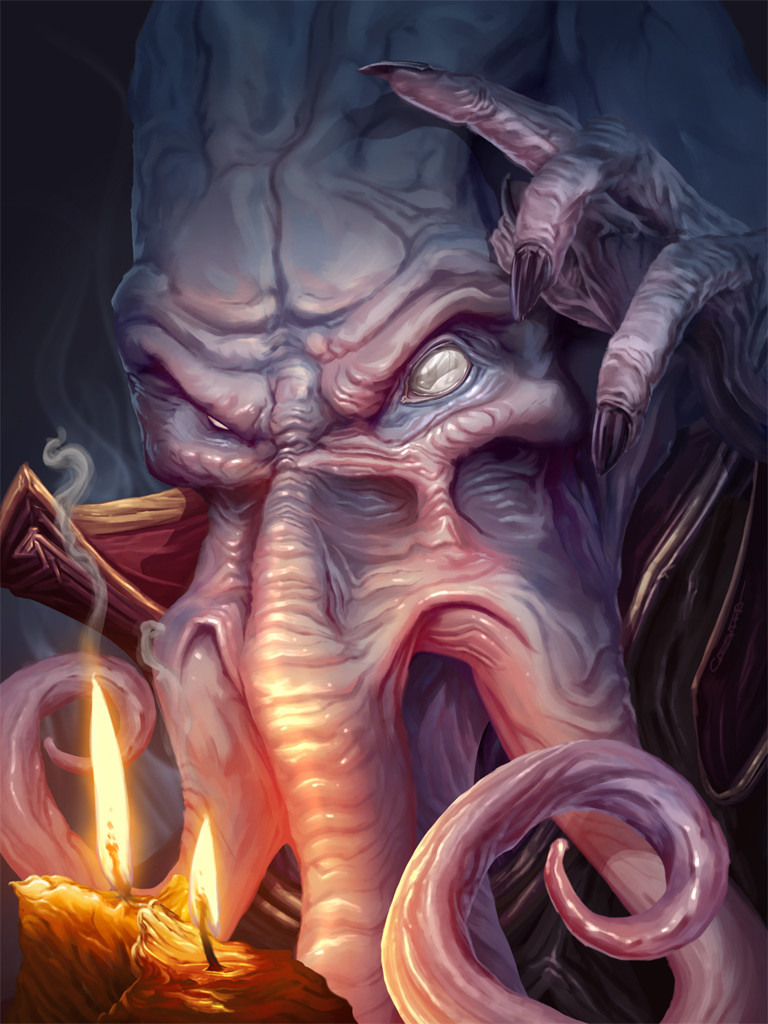
The Mind Flayer

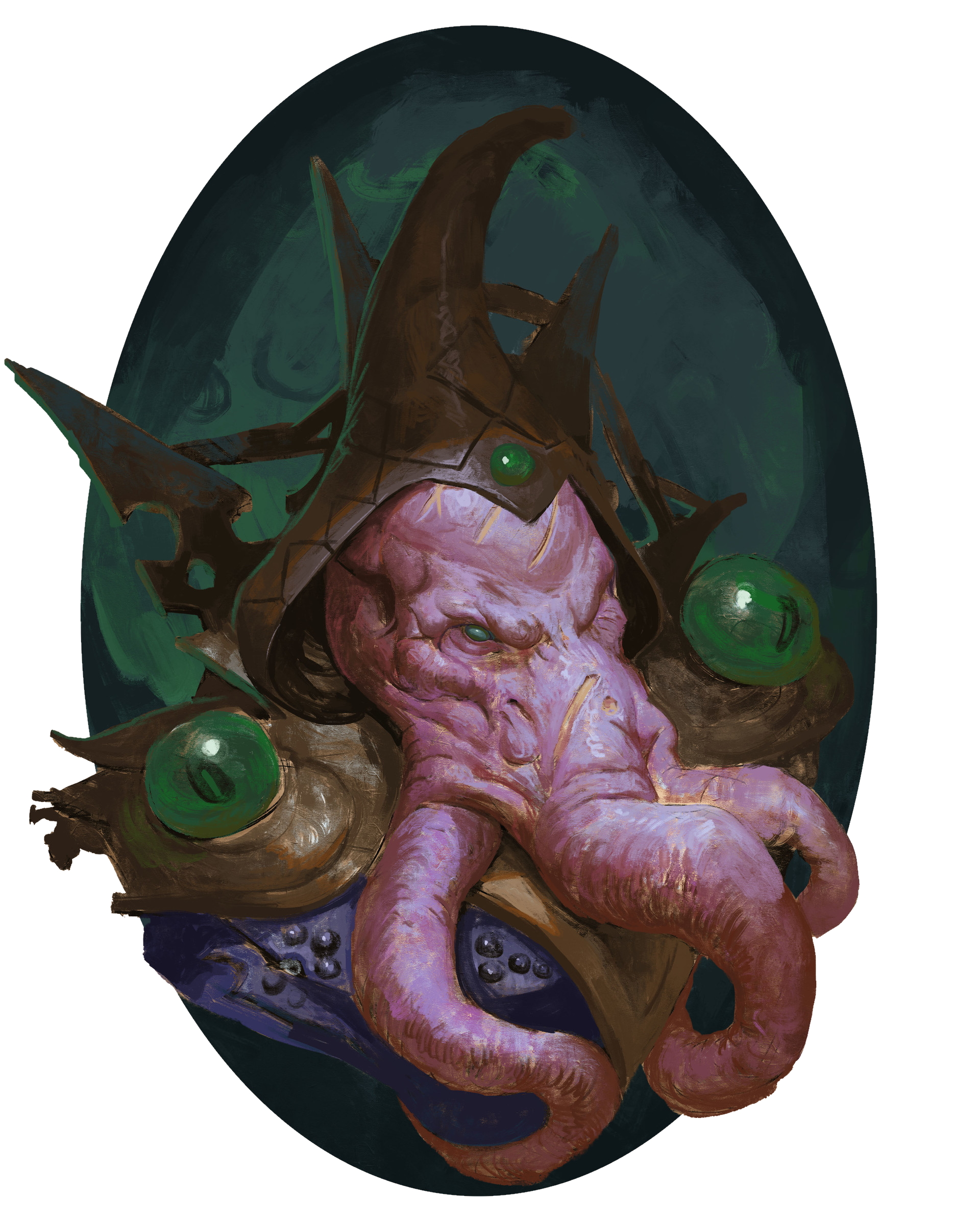
Mind Flayer Cohorts
Corax the Brute was a man known for murder most callous. His hairy forearms carried small but visible scars, each line marking a tally of his victims slain. The warden stared at him from across the darkened room.
"It's clear the usual rot won't flinch your kind." The warden's ample brows curled in displeasure. "So we brought in a friend. Done some fine work for us in years past. I'm sure he won't disappoint."
The warden left with a smirk. Corax just snorted.
The door open and closed again, and soon there was another man standing in the darkness. Just beyond the lantern's light the figure crossed its arms... then its tentacles.
Corax grinned. "Seen that trick before. Apprentice level sorcery, that. You remember to make your skin the right shade of purple, too?"
The creature sat down in the opposite chair. Its eyes lacked pupils, and mucus glistened upon its flesh. If this was a ruse, it was a damned convincing one.
"You will tell me," said a voice in Corax's head, "precisely where you hid their corpses." Then the criminal began to sweat. He had only heard tell of telepathy. Either this was a mage of some talent... or this was no joke.
"If I do not hear the words I seek, then through your thoughts I will find them. If I do not find them, then I will taste them, brigand."
art by Henrik Rosenborg cover art by Gabriel Cassata
What is a Cohort?
In short, a creature cohort is a monster, perhaps from the Monster Manual that has been converted into its own race and associated class (which are designed to be taken together). You create a cohort much like making a character, following the same rules in the Player's Handbook. One difference, though, is that cohorts typically don't pick a character background unless the monster in question had a prior profession.
Cohorts are designed to be flexible, so that DMs can do some of the following:
- DMs can use a cohort in place of the normal "Sidekick" rules from Tasha's Cauldron of Everything, allowing an iconic monster to act as a friendly NPC or even as a party member
- A cohort can be used as a monster that levels with the party (as a recurring enemy or rival, for instance)
- Cohorts can act as more powerful familiars, or as substitutes for animal companions (or similar class abilities)
Note: despite being mentioned above, you do not need to own Tasha's Cauldron of Everything to use cohorts.
Keep in mind that as of the time of this writing, creature cohorts are not designed for multiclassing nor balanced for such.
Mind Flayer Racial Features
As a mind flayer (also known as an 'Illithid') you are but one part of a fractured empire, one member of a race that once ruled the known multiverse. Hunted to the brink of extinction, mind flayers rely on their psionic abilities and multifaceted thinking to survive in a world hostile to their kind.
Ability Score Increase. Your Intelligence score increases by 2, and one other ability score of your choice increases by 1.
Age. An illithid starts its life as a tadpole, which must borrow into a humanoid's brain in order to begin the process of ceremorphosis, the transformation into a true illithid. A newly formed mind flayer is essentially an adult from the moment they finish transforming. In their bipedal form, illithids can live to be over a century old, with the oldest members of their kind regularly living to 120 or 130 years of age.
Alignment. Unlike most humanoids, few mind flayers have the ability to truly think for themselves. Most illithids are under the control of a mind flayer colony's elder brain, an entity with psychic abilities that rival all but the gods themselves. Mind flayers linked to an elder brain are virtually always lawful evil, following the directives set out for them by their masters.

Those illithids fortunate enough to break away from a colony have another obstacle to deal with-- the suspicion and hostility of most other races. Lone or exiled mind flayers can be of any alignment... but all illithids must eat the brains of intelligent creatures to survive, so finding victims that prove to be inoffensive (such as fugitives, bounty targets or goblins) can prove to be difficult.
Size. A recently transformed mind flayer takes on the size of its host's original body. Mind flayers generally look down upon the smaller races, and so illithids are typically Medium-sized.
Speed. Your base movement speed is 30 feet.
Darkvision. You can see in dim light within 60 feet of you as if it were bright light, and in darkness as if it were dim light. You can't discern color in darkness, only shades of gray.
Aberrant Nature. You count as an aberration for the purposes of spells and effects.
Telepathy. Your race are gifted with psychic abilities that make communication much more efficient. You are able to telepathically speak to any creature within 120 feet. You don't need to share a language to understand each other, but the creature must be able to understand at least one language.
Mind Reader. You know the detect thoughts spell by default. You may cast this spell once without using a spell slot, and without components. You may also cast this spell as though it were a ritual. You recover any expended use of this spell upon completion of a long rest.
Illithid Tentacles. You are able to use the tentacles protruding from your face as a natural form of protection as well as a means of hunting prey. These tentacles are able to channel your psionic energies whenever you attack with them, wracking your enemies with a pain from deep within their minds. You have a tentacle attack that deals psychic damage equal to 1d4 plus your Intelligence modifier. You use your Dexterity or Intelligence modifier (your choice) for attack rolls with your tentacles, which count as light weapons for the purposes of dual wielding.
Though you have four tentacles, you are limited to attacking with one at a time for damage purposes (though you are able to use your bonus action to attack with a second tentacle due to the fact that they are light weapons).
Languages. You can speak, read and write Common and Deep Speech. You can also read and write Qualith, a written language only known to Illithids.
New Class: The Mind Flayer
Class Features
As a mind flayer, you gain the following class features.
Hit Points
- Hit Dice: 1d8 per mind flayer level
- Hit Points at 1st Level: 8 + your Constitution modifier
- Hit Points at Higher Levels: 1d8 (or 5) plus your Constitution modifier per mind flayer level after 1st.
Proficiencies
- Armor: Light and medium armor, but not shields
- Weapons: Simple weapons
- Tools: none
- Saving Throws: Intelligence, Wisdom
- Skills: choose three from Arcana, Athletics, Deception, Insight, Intimidation, Perception, Persuasion, and Stealth.
Equipment
You start with the following equipment, in addition to any equipment granted by your background:
- (a) an explorer's pack or (b) a diplomat's pack
- a pickling jar and 50 gold
The Mind Flayer
| Level | Proficiency Bonus | Features | Extract Brain |
|---|---|---|---|
| 1st | +2 | Disguise Self, Tentacle | — |
| 2nd | +2 | Extract Brain, Grappler | 2d8 |
| 3rd | +2 | Discipline, Psionic Aptitude | 2d8 |
| 4th | +2 | Ability Score Improvement | 3d8 |
| 5th | +3 | Mind Blast, Piercing Extraction | 3d8 |
| 6th | +3 | Discipline Feature | 4d8 |
| 7th | +3 | Psychic Shock | 4d8 |
| 8th | +3 | Ability Score Improvement | 5d8 |
| 9th | +4 | Improved Psionics | 5d8 |
| 10th | +4 | Discipline Feature | 5d8 |
| 11th | +4 | Damaging Ichor, Greater Mind Blast | 6d8 |
| 12th | +4 | Ability Score Improvement | 6d8 |
| 13th | +5 | Magic Resistance | 7d8 |
| 14th | +5 | Discipline Feature | 7d8 |
| 15th | +5 | Pyramid Psyche | 8d8 |
| 16th | +5 | Ability Score Improvement | 8d8 |
| 17th | +6 | Supreme Mind Blast | 9d8 |
| 18th | +6 | Psionic Commander | 9d8 |
| 19th | +6 | Ability Score Improvement | 10d8 |
| 20th | +6 | Favored of Ilsensine | 10d8 |
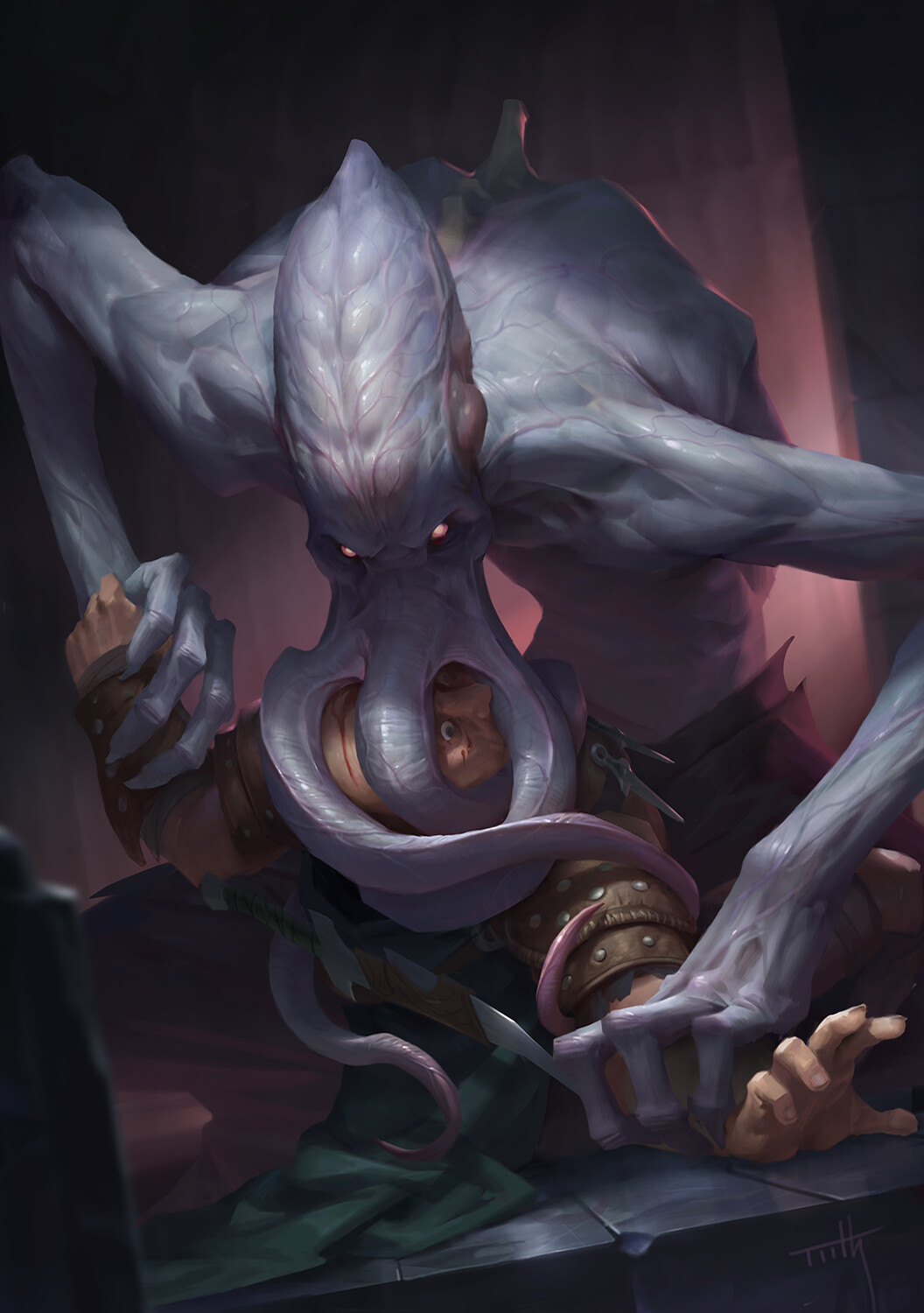

Disguise Self
As a race, the dreaded Mind Flayers are often thought to be monstrous and beyond redemption. Regardless of your personal views, you learn quickly to hide your true nature in order to survive.
At 1st level, you learn the disguise self spell. You may cast the spell without components, and without using a spell slot. You may cast the spell in this way once per point of proficiency bonus, and you recover all expended uses upon completion of a long rest.
Tentacle
If you do not already posess a tentacle attack, you gain one as a part of this class. Whether it be through dark magicks, a mutation, or a monstrous graft, you now have the ability to disrupt the psyche of your enemies with a mind flayer's natural weapon.
At 1st level, you gain two tentacles which count as natural weapons (unless you already have psychic tentacle attacks from the mind flayer race). Your tentacles are treated as light melee weapons. You use your Dexterity or Intelligence modifier (your choice) for attack rolls, and the tentacles deal psychic damage equal to 1d4 plus your Intelligence modifier. As a natural weapon, you are considered proficient with your tentacle attacks.
Extract Brain
Until now, you have had to rely largely on the brains of the recently deceased in order to sustain you. At 2nd level, though, you learn to more efficiently remove the brains of creatures when in combat. As an action, you make one tentacle attack against an incapacitated humanoid within your reach, or against a humanoid already grappled by your tentacles. On a hit, you deal 2d8 piercing damage to the creature instead of your normal tentacle damage. If this damage reduces the target to 0 hit points, you may choose to extract and devour its brain as a part of this action, killing the creature instantly.
The damage of this ability increases as you gain levels in this class, as shown in the Extract Brain column of the Mind Flayer table.
Grappler
A tentacle is not just an effective means for defending oneself-- it can also be a useful tool to prevent your enemies' escape. Starting at 2nd level, immediately after you hit a creature with your tentacle attack, you can try to grapple the target if it is Large or smaller.
Using this ability does not require an action. Once you have used this ability, you may not do so again until the beginning of your next turn.
In addition, you use your Intelligence modifier instead of Strength for any grapple checks that you make with your tentacles.
Discipline
Mind Flayers possess a terrifying intelligence, and with it they have the ability to learn new and more effective methods of enforcing their collective will. At 3rd level, you choose a discipline to make your own-- the Apostate or the Sleeper-- and you gain unique abilities depending on the path you choose. Both of these disciplines are detailed at the end of this class description.
Psionic Aptitude
The mind of an illithid is considered by some to be inscrutable and labyrinthine. One trait that all mind flayers are known to share, though, is their innate psionic ability. At 3rd level, you learn the detect thoughts and levitate spells. You may cast these spells a combined number of times equal to your proficiency bonus.
You do not require any components when casting either of the above spells using this ability, nor do you use any spell slots. You use Intelligence as your spellcasting ability for these spells, and the save DC is calculated as follows:
Spell Save DC
You regain all uses of these spells upon completion of a long rest.
art by Tooth Wu


art by Wayne England
Ability Score Improvement
When you reach 4th level, and again at 8th, 12th, 16th, and 19th level, you can increase one ability score of your choice by 2, or you can increase two ability scores of your choice by 1. As normal, you can't increase an ability score above 20 using this feature.
Mind Blast
At 5th level, you learn to use what is perhaps the Mind Flayer's greatest psychic weapon... at least in a limited fashion. As an action during your turn, you emit psychic energy in a 30-foot cone. Each creature in that area must succeed on an Intelligence saving throw against your Psionic Aptitude save DC. Creatures who fail their saves take 2d8 psychic damage and are stunned until the end of your next turn. A creature can repeat the saving throw at the end of each of its turns, ending the effect on itself on a success.
You may use this ability once per point of intelligence modifier (minimum of one use). Once you use this ability, you must wait 1d6 rounds before you can use it again. You regain any expended uses of mind blast upon completion of a long rest.
.
Piercing Extraction
Starting at 5th level, your extract brain ability is considered magical for the purpose of overcoming resistance and immunity to nonmagical attacks and damage.
In addition, your tentacle attacks now deal psychic damage equal to 1d6 plus your intelligence modifier.
Psychic Shock
Illithid tentacles can cause a cerebral jolt to those that merely touch them. At 7th level, though, you learn to cause a more severe disruption to your opponent's consciousness. Whenever you hit an enemy with a tentacle attack, you may choose to stun the creature with a blast of psychic energy as part of that attack. The creature must make an Intelligence save against your mind blast DC or be stunned until the end of your next turn. You may then use your grappler ability if you have not already used it this turn.
You may use this ability once per point of Intelligence modifier (minimum of one use). You regain all expended uses of this ability upon completion of a long rest.


Improved Psionics
At 9th level, you learn the confusion and telekinesis spells. You may cast each of these spells once without any components, and without using a spell slot.
You recover any expended use of these spells upon completion of a long rest. You use Intelligence as your spellcasting ability for these spells, and the save DC is equal to your Psionic Aptitude save DC.
In addition, you may now cast detect thoughts at will.
Damaging Ichor
With a sufficiently brain-rich diet, your flesh begins to secrete a thin, transparent oil. This substance acts as a conduit of psychic energy--allowing you to channel more psionic power through your attacks.
Starting at 11th level, your tentacle attacks now deal psychic damage equal to 2d6 plus your Intelligence modifier.
In addition, you may spend one minute coating a melee or ranged weapon in your secretions, adding an additional 1d6 psychic damage to attacks with the coated weapon if you are holding it. This ability lasts 1 hour. You may use this ability any number of times in a day, but may only coat up to two weapons at a time.
Greater Mind Blast
Honing your skills further, you become more proficient in blasting your enemies with raw psychic power. At 11th level, your mind blast ability has its range extended to a 45-foot cone, and its stun duration becomes 1 minute. Your mind blast now deals damage equal to 4d8 plus your Intelligence modifier.
Magic Resistance
Starting at 13th level, you have advantage on saving throws against spells and other magical effects.
Pyramid Psyche
An illithid's mind often contains contingencies, backup plans, and hidden places that no probe could ever hope to find. Through your telepathic connections, you can even help bolster the minds of others against outside influence. At 15th level, whenever you or an ally within 60 feet are targeted by a spell or ability, you can use a reaction to cast the mind blank spell targeting that ally. This spell does not require any components and does not use a spell slot when cast in this way. The mind blank spell has a range of 60 feet when cast using this ability. The duration of this mind blank spell lasts 1 hour.
You may use this ability once. You recover any expended use of this ability upon completion of a short rest.
Supreme Mind Blast
At 17th level, you learn to harness your psionic potential without taxing yourself. Your mind blast now affects a 60-foot cone. You may also use your mind blast ability any number of times in a day. Once you use your mind blast ability, you must still wait 1d6 rounds before using it again.
Psionic Commander
Starting at 18th level, you learn the dominate monster and plane shift spells. You may cast each of these spells once without any components, and without using a spell slot. When casting the plane shift spell using this ability, you can only target yourself. You still require the costly material component for plane shift if your chosen destination is anywhere other than the Far Realm or the Material Plane.
You recover any expended use of these spells upon completion of a long rest. The save DC of these spells is equal to your mind blast save DC.
Favored of Ilsensine
At 20th level, your psionic capabilities have become all but peerless. You can speak telepathically to any creature within 300 feet that is capable of understanding a language, even if you do not share a language with them. You automatically detect the presence of any creature with Intelligence of 4 or higher within this radius so long as you are conscious. A creature protected by a mind blank spell, a nondetection spell, or similar magic can't be perceived in this manner.
In addition, your tentacle attacks become further enhanced. Your tentacle attacks deal 2d10 psychic damage, and you have advantage when you initiate a grapple with your tentacles.
art by Julio Rocha
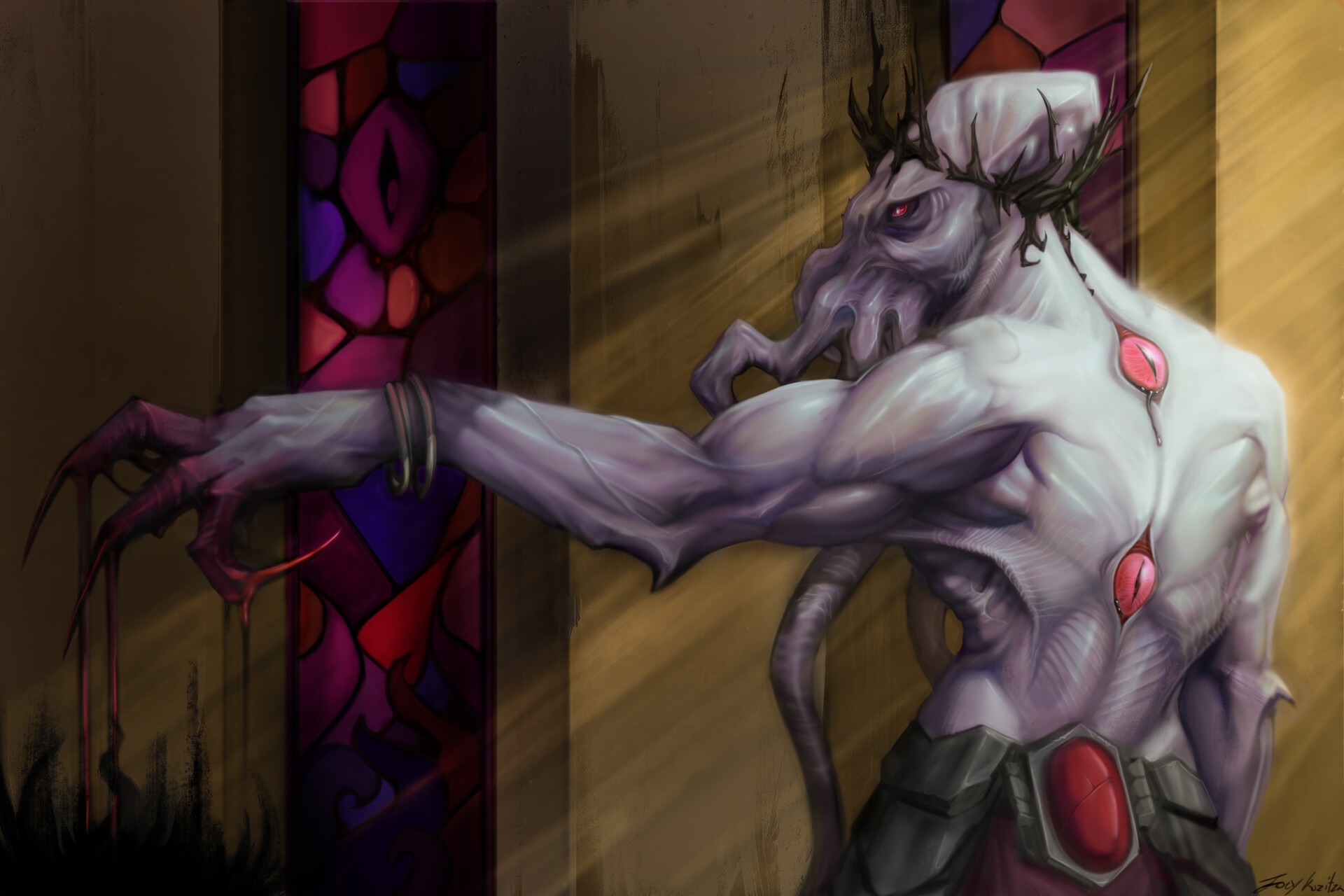

Mind Flayer Disciplines
At 3rd level, the mind flayer cohort chooses one of the following disciplines to enhance their craft: The Apostate or the Sleeper. Some mind flayers turn away from the all-consuming thoughts of their elder brain, instead choosing to embrace the freedom that arcane magic affords them. Other illithids--loyal or not--instead hone their psionic talents to become exceptional hunters of intelligent prey.
The Apostate
All mind flayers have incredible psionic potential, but the world of arcane lore is a rare pursuit for these creatures. This is largely because elder brains, as a whole, consider arcane magic to be a persistent threat against their total dominion. Therefore, illithids with magical abilities are usually hunted down by their own colonies. Those that are not executed can become formidable casters in addition to retaining their psychic abilities. Reverse engineering magic from scratch is not a simple task, but some schools of magic are not all that different from their natural psionics. As such, mind flayers tend to become specialized, but nonetheless skilled arcanists.
Arcane Awakening
At 3rd level, you gain the ability to cast spells exactly like a member of the Wizard class. You follow all of the rules and limitations of a Wizard as though you were a proper member of the class, including the use of a spellbook and the ability to cast ritual spells. Intelligence is your spellcasting ability, and is used to determine your spellcasting save DC as well as your spell attack modifier, shown below:
Spell Save DC
Spell attack modifier
There are a few differences between you and a true wizard, however. You start with knowledge of three wizard cantrips of your choice, and your spellbook begins with four 1st-level wizard spells of any school. Each time you gain a mind flayer level, you can add one wizard spell of the Abjuration, Divination, Enchantment or Illusion school to your spellbook. This spell must be of a level for which you have spell slots.
You can cast 1st-level wizard spells of any school, but for now you are unable to cast any 2nd-level or higher wizard spells outside of the Abjuration, Divination, Enchantment or Illusion schools, including spells copied to your spellbook from elsewhere. When you prepare spells, you choose a number of wizard spells equal to your Intelligence modifier + half your mind flayer level, rounded down (minimum of one spell). The spells must be of a level for which you have spell slots. You also do not gain as many spell slots as a true wizard, instead following the below spell slot progression:
.
art by Jack Kozitza
Apostate Spell Slots
| Level | 1st | 2nd | 3rd | 4th | 5th |
|---|---|---|---|---|---|
| 3rd | 3 | — | — | — | — |
| 4th | 3 | — | — | — | — |
| 5th | 4 | 2 | — | — | — |
| 6th | 4 | 2 | — | — | — |
| 7th | 4 | 3 | — | — | — |
| 8th | 4 | 3 | — | — | — |
| 9th | 4 | 3 | 2 | — | — |
| 10th | 4 | 3 | 2 | — | — |
| 11th | 4 | 3 | 3 | — | — |
| 12th | 4 | 3 | 3 | — | — |
| 13th | 4 | 3 | 3 | 1 | — |
| 14th | 4 | 3 | 3 | 1 | — |
| 15th | 4 | 3 | 3 | 2 | — |
| 16th | 4 | 3 | 3 | 2 | — |
| 17th | 4 | 3 | 3 | 3 | 1 |
| 18th | 4 | 3 | 3 | 3 | 1 |
| 19th | 4 | 3 | 3 | 3 | 2 |
| 20th | 4 | 3 | 3 | 3 | 2 |

Eldritch Expansion
At 6th level, you may add two wizard spells of up to 2nd level to your spellbook. These spells may be from any school. You are able to cast the chosen spells normally even if they are outside the Abjuration, Divination, Enchantment or Illusion schools, and these spells do not count towards your maximum number of prepared spells at any given time.
Whenever you complete a long rest, you may replace one or both of the chosen spells with other spells in your spellbook, which then gain the benefits listed above. The new spells must also be of a spell level for which you have spell slots.
At 14th level, you may add two more wizard spells of up to 4th level to your spellbook. These spells may be from any school. You can then choose four spells from your spellbook that gain the above benefits, and can replace up to four of these chosen spells upon completion of a long rest.
Douse The Mind
Starting at 6th level, you learn to more effectively pair your mind blast ability with your arcane knowledge. Stunned enemies that you can see have disadvantage on Intelligence, Wisdom and Charisma saves against your spells.
Spell Disruptor
With intimate knowledge of both psionic and arcane powers, you learn to reverse engineer the spells of others... and can even deconstruct spells as they are being cast.
Starting at 10th level, you have advantage on any Arcana skill checks that you make to identify spells as they are being cast. You also learn counterspell, and may prepare the spell without the use of a spellbook. When you cast counterspell, you treat the spell as though it were cast with a spell slot one spell level higher than the one you actually used (for example, using a third level spell slot would be treated as a fourth level slot used for the purposes of countering a spell).
Plans Upon Plans
Once you reach 14th level, you learn the contingency spell. You may cast this spell once without using a spell slot. Instead of the normal material component, you instead require a small nonmagical token (a trinket, a bauble, or any other mundane item small enough to fit in your hand). As an action, you imprint this item with a tiny spark of your psionic power, such that it has a tiny, faint aura detectable by the detect magic spell. This token item is treated as the material component for any contingency spell you cast per the spell's description.
If your token item is ever lost or destroyed, you may use an action to imprint a new nonmagical item. Doing so causes your previous contingent spell to fizzle immediately, but harmlessly.
The Sleeper
Mind flayers, at the societal level, have a problem. They are actively despised by many other intelligent creatures, and yet they must feed on the brains of those foes to survive. A strategy common to illithid colonies is to have some of their more skilled members infiltrate humanoid civilizations. Through sabotage, manipulation and deceit, these spies often rely on thralls to do what they cannot be caught doing. When discovered or cornered, though, sleepers are quite capable of defending themselves, rending their foes with uncanny precision.
Forced Extraction
Starting at 3rd level, you learn to use your extract brain ability even on non-traditional prey. In addition to humanoids, you may now target any creature with your extract brain ability, so long as that creature has a brain, is large-sized or smaller, and is not a construct nor undead.
Infiltrator
As a sleeper agent, you are trained to blend into the environments of your enemies. This includes becoming an expert in improvisation when the situation demands it.
Once you reach 3rd level, you gain proficiency in the Deception and Persuasion skills. If you are already proficient in either Deception or Persuasion, you may instead choose another skill from the mind flayer class proficiencies list. In addition, whenever you fail a Deception or Persuasion ability check, you may choose to reroll that skill check. You must use the result of the new roll.
You may reroll an ability check once using this ability, and you recover any expended use upon completion of a long rest.
Enemy of My Enemy
At 6th level, you learn the crown of madness and suggestion spells. You may cast each of these spells twice without using a spell slot and without components. The save DC for these spells is equal to your Psionic Aptitude save DC.
When concentrating on the crown of madness spell, you may use your bonus action to maintain control over the target.
You regain all expended uses of the above spells upon completion of a long rest.
Psionic Jaunt
You learn to draw upon your enemy's dying thoughts to fuel a short jump, allowing you to maul the next unfortunate target as you go.
Starting at 10th level, whenever you reduce an adjacent enemy to 0 hit points, you may use your reaction to teleport up to 30 feet to an unoccupied space that you can see. Once you arrive in this space, if an enemy is adjacent to you, you may make a single tentacle attack against that creature as a part of this reaction. You may then make a free grapple check against this creature if you hit.


.
art by Jeff Kristian
Sleeper Thrall
It is sometimes said that the greatest power of a mind flayer is their ability to make their enemies into allies. At 14th level, you learn the geas spell. You may cast this spell once without a spell slot and without components. The casting time of your geas spell is 1 round. The save DC of this spell is equal to your Psionic Aptitude DC, and you regain any expended use of this spell upon completion of a long rest.
You may only affect one creature at a time with your geas spell. Casting geas on a new target causes any previous geas to immediately cease.
In addition, whenever a creature fails a saving throw against your suggestion spell, you may choose to delay the spell taking effect. If you do so, the creature is not aware that they have been affected by the spell. Instead, the spell only takes effect when a certain circumstance occurs, just like when using the contingency spell. You describe the circumstance when you cast the suggestion spell. For example, you may target a castle guard with the suggestion spell and order them to lower the drawbridge, stating that this spell takes effect as soon as you are attacked. You must specify any command for your suggestion spell at the moment you initially cast the spell.
If you delay a spell using this ability, you do not need to be in range nor line of sight at the moment the spell takes effect. You do not need to concentrate on the suggestion spell when delayed in this way, but the spell has its duration reduced to 10 minutes when delayed.
You may only delay a single spell at a time using this ability, and if the condition you specify is not met after five days, the spell fizzles without any effect. If you attempt to delay a spell while another spell is still awaiting its triggering condition, the earlier casting of suggestion fizzles.
Thralldom Doctrine
Use of smaller races (gnomes, halflings, goblins) in our plans is acceptable, even if not ideal. Remember that there is no shame in using the resources available to you. Only when one is inefficient or wasteful is there reason to doubt ones abilities. When one has the luxury of choice, however, we recommend the use of hardy folk, such as humans, dwarves or orcs as the backbone of your thrall herd. Elves are unreliable-- their magical talents create opportunities to slip the leash as it were. Our colony by their capital's edge? Destroyed in less than a tenday, the insurrection starting with an act of defiance by one elven waif. Not worth revisiting.
-Zizkinaul, Elder Brain

Mind Flayer Cohorts- Miscellany
Challenge Rating for Mind Flayers
The following challenge ratings are based on the Monster Statistics by Challenge Rating table on page 274 of the Dungeon Master's Guide. Note that the below numbers were calculated without accounting for equipped magic items.
As a point of reference: The average level 20 player character may have a CR around 12-14 depending on the character's build and magic items, and can become higher still when using an optimized build and powerful items.
| Cohort Level | Recommended CR |
|---|---|
| 1 | 1/2 |
| 2 | 1/2 |
| 3 | 1 |
| 4 | 2 |
| 5 | 3 |
| 6 | 3 |
| 7 | 3 |
| 8 | 4 |
| 9 | 5 |
| 10 | 5 |
| 11 | 6 |
| 12 | 6 |
| 13 | 7 |
| 14 | 7 |
| 15 | 7 |
| 16 | 8 |
| 17 | 9 |
| 18 | 10 |
| 19 | 11 |
| 20 | 12 |
Roleplaying as a Mind Flayer
When roleplaying as an illithid, it is best to remember that the presence or absence of an elder brain makes a considerable difference in one's worldview. An elder brain considers itself the most knowledgeable and important being in the multiverse, and as such individual thought is only allowed as long as it does not deviate from the elder brain's own objectives. The fact that an elder brain has a psychic connection with each and every member of its colony (as long as they are within 5 miles of it) makes enforcing this mantra possible.
As such, you must ask the question-- is your mind flayer loyal to an elder brain (which, if the illithid is still part of a colony, it likely is) or are you separated from your colony and therefore, fully free?
If a loyal mind flayer is found outside of its colony, then it is virtually always searching for either food or potential thralls. Mind flayer spies might surveil a humanoid village, town or city with the intent of manipulating its peoples against one another, allowing for the subtle corruption and downfall of said society. A people in disarray make for easy pickings.
For mind flayers that willingly leave their colony (as in the case of arcanists or other exiles), their exceptional willpower allows them, in time, to break away from the indoctrination of their former elder brain. Mind flayers that live outside illithid society often come to realize that subjugating others is not the only way to survive. Other creatures have their own strengths, and in the end it is actually possible to find sincere and willing allies.
Before alliances can be forged, however, one must first learn to survive...
Sources of Food
Mind flayers eat brains, specifically the brains of intelligent creatures (with a minimum of 4 intelligence). The reason for this is because, though the brain itself offers some nutrients, the main source of sustenance (for a mind flayer, at least) is in a creature's dormant amounts of psychic energy. Though sources are hard to come by, the 3.5 Edition supplement Lords of Madness: The Book of Aberrations states that a mind flayer must feed on an intelligent creature's brain once per month in order to stay alive. Ideally, an illithid eats a intelligent creature's brain once every week to two weeks to maintain its physical and mental health.
In order to live peacefully amongst other creatures (especially the humanoid races) one must either hide the fact that they are eating brains, or a mind flayer must find an acceptable source of food. Bounty targets, and other criminals marked for death, allow a mind flayer to take on a role constructive to society while also ensuring its own survival. An illithid executioner would hardly want for food. In times of war, feasting on the opposing side might be seen as less than tasteful, but a mind flayer's allies are much more likely to keep their mouths shut in order to avoid alienating such a powerful asset.
When the above options are not available or plentiful, it is not uncommon for an illithid to eat the brains of goblins or other (generally) maligned creatures as a way of keeping monster populations under control. If nothing else, this is usually enough to keep the locals at bay.


Mind Flayers as PCs
Compared to some of the other cohorts released so far, mind flayers were designed from the start to be fairly seamless between their cohort and player character versions. That said, some adjustments are still recommended when playing a mind flayer character:
- Allow the mind flayer character to choose a background normally.
- In a campaign where magical items are readily available (or regularly rewarded) allowing an item such as the below Bracers of Keening will allow a mind flayer to enhance its tentacle attacks to be as effective as magical weapons.
Bracers of Keening
Wondrous item, uncommon (+1), rare (+2), or very rare (+3) (requires attunement by a mind flayer or a member of the mind flayer class) While wearing these bracers, you gain a magical bonus to your attack and damage rolls with your tentacle attacks as well as with your extract brain ability. The bonus is determined by the bracers' rarity.
Credits
Cover Art by Gabriel Cassata (https://www.artstation.com/gabriel_cassata) Page 2 Art by Henrik Rosenborg (https://www.artstation.com/henrikrosenborg) Page 4 Art by Tooth Wu (https://www.artstation.com/tooth) Page 5 Art by Wayne England (https://www.comicartfans.com/comic-artists/Wayne_England.asp) Page 6 Art by Julio Rocha (https://www.artstation.com/julio3d2d) Page 7 Art by Jack Kozitza (https://www.artstation.com/joeykozitza) Page 9 Art by Jeff Kristian (https://www.artstation.com/jekrimo) Page 11 Art by Wayne Reynolds (https://www.waynereynolds.com) Back Cover Art by Sean Usyk (https://www.artstation.com/seanusyk) Watercolor stains by Jared Ondricek (https://watercolors.giantsoup.com/xgte/xgtebottom-left/index.html) *Note: Portions of the "Sources of Food" section come from the 3.5 Edition supplement Lords of Madness: The Book of Aberrations
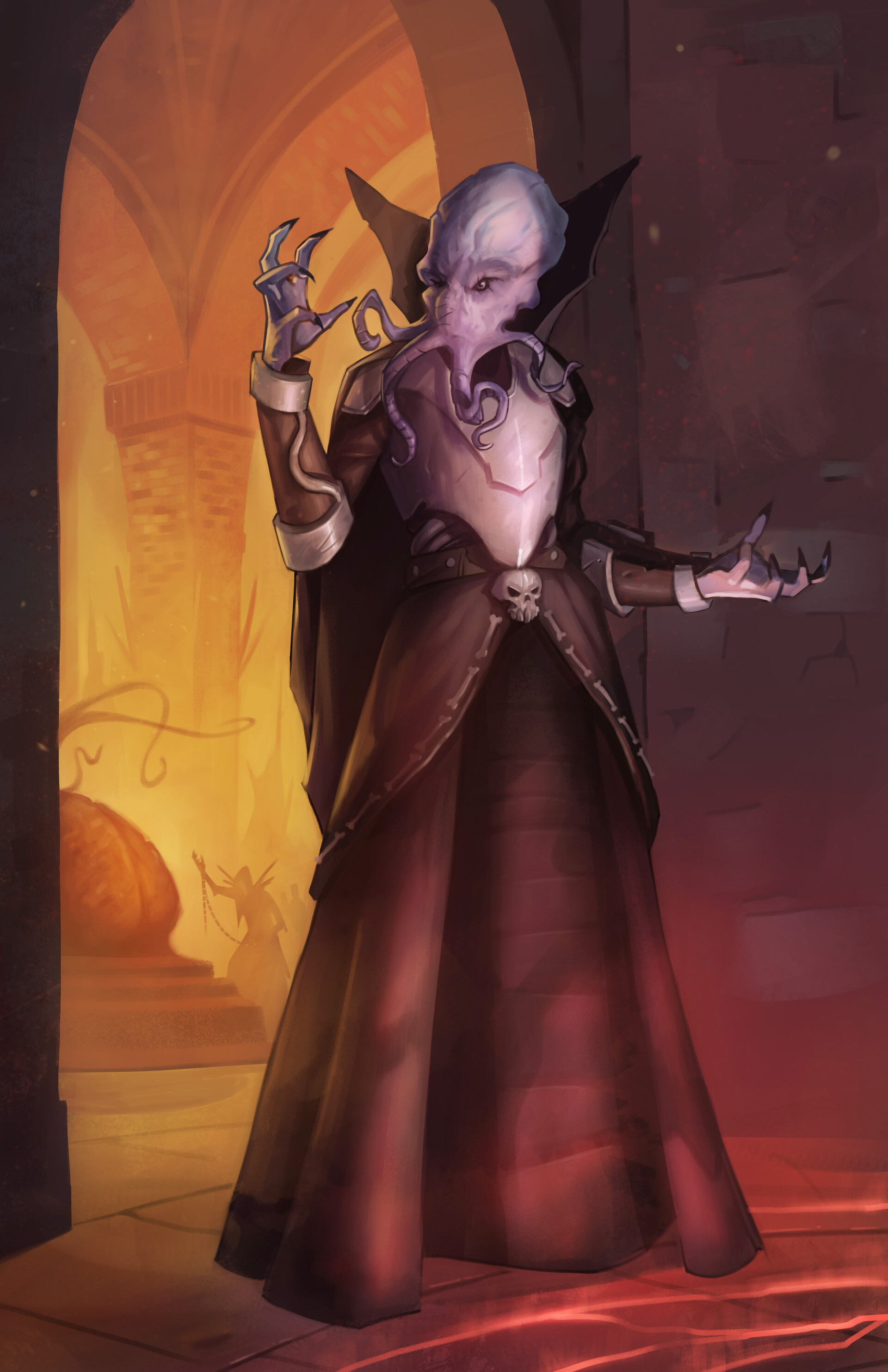

May Your
Sidekick
Eat Hearty
Creature Cohorts were created by me, Mister_Thr33, and were inspired by Tasha's Cauldron of Everything as well as the 3rd Edition supplement Savage Species
'Creature Cohorts' is unofficial Fan Content permitted under the Fan Content Policy. Not approved/endorsed by Wizards. Portions of the materials used are property of Wizards of the Coast. ©Wizards of the Coast LLC.
No creatures of 4 or more Intelligence were harmed in the creation of this document
Thank you all for your support!